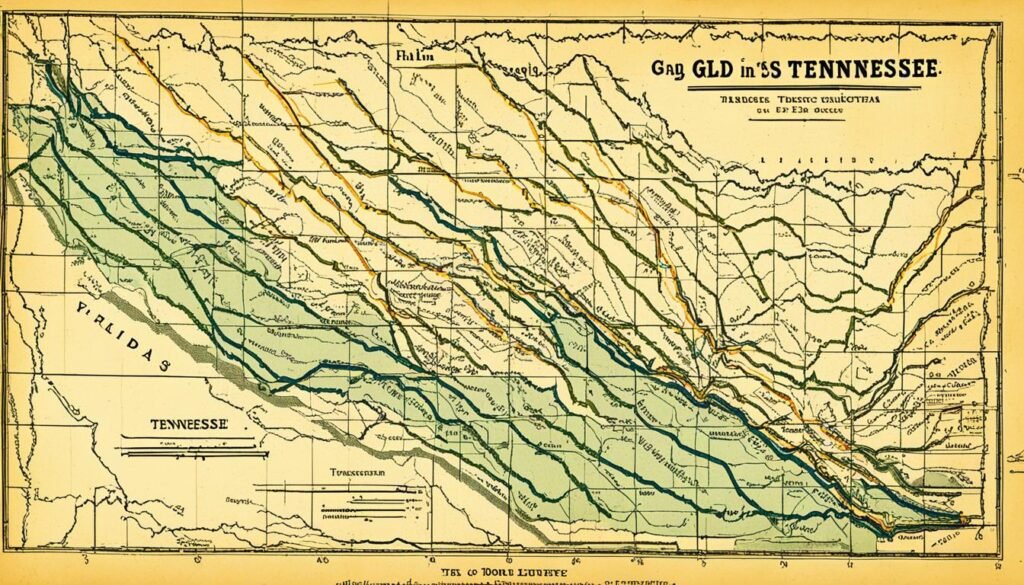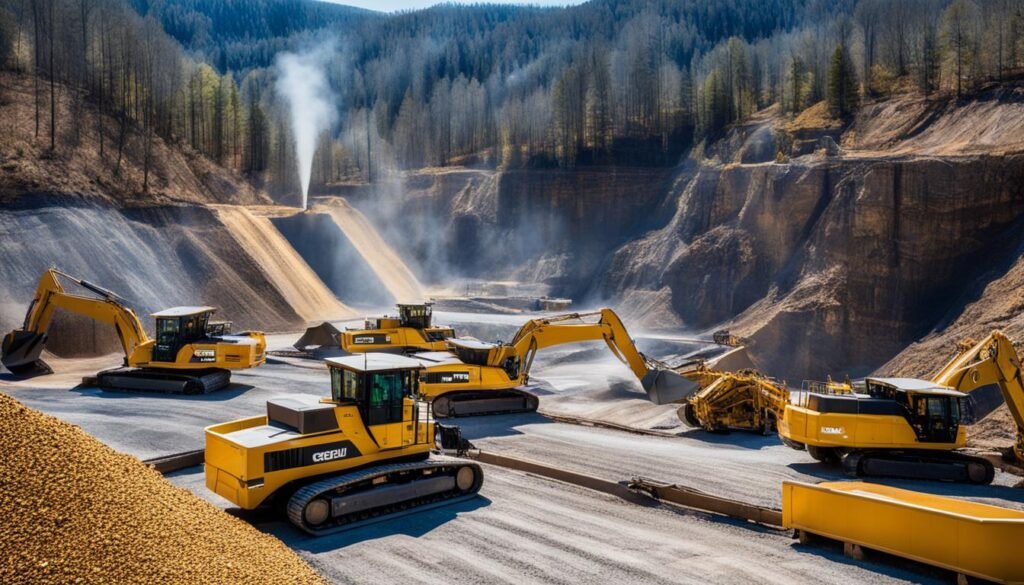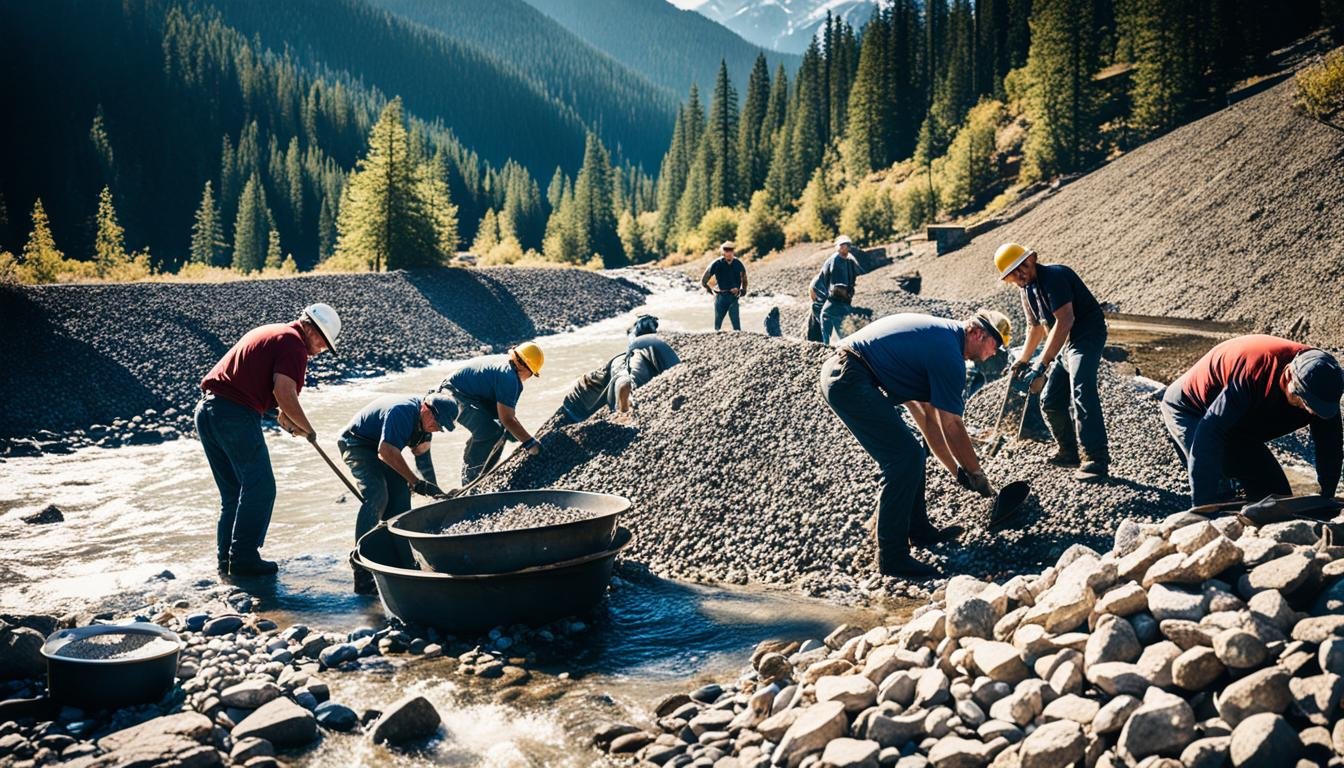Have you ever wondered about the hidden gold mines of Tennessee?
While it may not be as famous as the gold rushes of California or Alaska, Tennessee has a fascinating history of gold mining that’s waiting to be explored.
From smallscale operations in the early days to recreational prospecting today, Tennessee’s gold mining heritage offers a unique journey into the state’s past.
Key Takeaways about Gold Mining in Tennessee
- Tennessee has a lesser-known history of gold mining compared to California or Alaska.
- Gold mining in Tennessee was characterized by small-scale operations and played a role in the development of local communities.
- Recreational gold prospecting is popular in Tennessee, with hotspots like Coker Creek and Tellico River attracting enthusiasts.
- Technological advancements have reshaped the prospects of gold mining in Tennessee.
- Exploring Tennessee’s gold mining heritage provides insight into its historical and cultural significance.
Join us as we delve into the rich history of gold mining in Tennessee, uncovering the tales of Monroe County, the traditional gold hunting techniques used, and the economic impact it had on local communities. Discover the recreational gold panning hotspots in Tennessee and learn about the technological advancements that are reshaping the prospects of modern-day gold mining.
So, are you ready to unearth the secrets of Tennessee’s gold mining past? Let’s embark on this historical and cultural journey together!
A Glimpse into Tennessee’s Gold Mining Heritage
Tennessee’s gold mining heritage can be traced back to the early 1800s when the state experienced modest gold discoveries in its southeastern region. Although it did not witness the large-scale gold rushes seen in the West, gold mining in Tennessee had its unique character with small-scale operations focused on streams and rivers. These early gold discoveries played a significant role in the establishment of mining camps and settlements, showcasing the enduring allure of gold in human settlement and economic development.
While Tennessee’s gold mining history may not be as widely recognized as other regions, it remains an essential part of the state’s heritage. The pursuit of this precious metal shaped the lives of many individuals and communities, leaving a lasting impact on Tennessee’s cultural fabric. Exploring Tennessee’s gold mining heritage offers insight into the resilience and determination of early prospectors and their contributions to the state’s history.
If you’re intrigued by Tennessee’s gold mining heritage, you won’t be disappointed by the richness of its stories and the historical significance they hold. Whether it’s the tales of mining camps, the struggles and triumphs of individual prospectors, or the economic impact on local communities, Tennessee’s gold mining heritage offers a fascinating glimpse into the past.
Discover the allure of Tennessee’s gold mining heritage and immerse yourself in the captivating stories that unfolded amid the pursuit of this precious metal.
Exploring the Early Days of Gold Discovery in Tennessee
Monroe County: The Cradle of Tennessee’s Gold Era
Stream Panning and Sluicing: Traditional Gold Hunting Techniques
Monroe County played a significant role in Tennessee’s gold era, serving as the cradle of gold mining in the state. It was one of the primary regions where gold was discovered and where small-scale mining operations took place.
Buy Gold Online: The Smart and Secure Way
Discover the safest and most reliable strategies to buy gold online. Make informed investment decisions and secure your financial future today!
Learn MoreStream panning and sluicing were the traditional gold hunting techniques employed in Tennessee’s early days of gold mining. Prospectors would pan or use sluice boxes to separate gold particles from sand and gravel in streams and rivers.
| Stream Panning | Sluicing |
|---|---|
| Simple method | Utilizes running water |
| Prospectors use a pan to scoop up sediment from the streambed | Prospectors construct a wooden box with riffles to capture the denser gold particles |
| Through swirling and shaking, lighter materials wash away, leaving behind the heavier gold | The sluice box is placed in the stream, and water is directed through it, washing away lighter materials while trapping gold particles |
| Requires patience and skill to identify potential gold-bearing sediments | A more efficient method for processing larger amounts of material |
| Often used for prospecting in remote areas or areas with limited water supply | Widely used in the early days of gold mining to process larger volumes of sediment |
Gold Mining’s Role in Tennessee’s Economic Tapestry
While gold mining in Tennessee did not cause significant economic upheaval on a large scale, it played a role in the development of specific local communities. The allure of gold attracted prospectors and miners, leading to the establishment of mining camps and settlements. This period in Tennessee’s history showcases the impact of gold on local economies and culture, albeit not as prolific as other regions.

The economic impact of gold mining in Tennessee was felt at a local level. As prospectors flocked to the state in search of gold, mining camps sprang up, fueling economic activity in surrounding areas. The establishment of settlements and infrastructure to support mining operations created jobs and brought prosperity to these communities. Although the scale of gold mining in Tennessee was not on par with the famous gold rushes of California and Alaska, it nevertheless left a mark on the state’s economic tapestry.
“The discovery of gold in Tennessee brought hope and opportunity to our community. Miners from all walks of life came here in pursuit of their dreams, and the presence of gold brought prosperity to our small town.” – Local resident
In addition to the direct economic impact, gold mining in Tennessee also influenced the region’s culture and identity. The pursuit of gold became intertwined with the local way of life, shaping traditions, stories, and folk songs. As a result, gold mining holds a place of significance in Tennessee’s historical narrative and cultural heritage.
While Tennessee’s gold mining industry may not have rivalled other regions in terms of economic output, it played a vital role in shaping the local economy and leaving a lasting legacy. Today, the remnants of this rich history continue to attract interest from mining enthusiasts and historians alike.
| Impact | Gold Mining in Tennessee |
|---|---|
| Local Economy | Establishment of mining camps and settlements, job creation |
| Cultural Significance | Influence on local traditions, stories, and folk songs |
Recreational Prospecting: Gold Panning Hotspots Today
If you’re a fan of recreational gold prospecting, Tennessee has some fantastic hotspots where you can indulge in the thrill of gold panning. Two popular locations that attract enthusiasts from near and far are Coker Creek and Tellico River.
The Allure of Coker Creek
Coker Creek, situated within the breathtaking Cherokee National Forest, boasts a rich gold mining history that dates back to the early 1800s. This picturesque area offers gold panning opportunities for both beginners and experienced prospectors. As you sift through the gravel and sand, you never know what hidden treasures await!
Tellico River’s Gold-Panning Legacy
Another hotspot for gold panning in Tennessee is the Tellico River. With a legacy of gold findings, this beautiful river entices recreational prospectors with the promise of finding that elusive nugget. The peaceful surroundings and the thrill of the hunt make Tellico River a must-visit destination for gold panning enthusiasts.
So, grab your pan and head to these hotspots to experience the excitement of recreational gold prospecting in Tennessee!

The Modern-Day Gold Rush: Technology Reshapes Tennessee’s Prospects
Advancements in Prospecting Tools and Techniques
Modern gold prospecting in Tennessee has been influenced by significant advancements in prospecting tools and techniques. These innovations have revolutionized the way prospectors hunt for gold, making their efforts more efficient and effective.
Today, prospectors have access to a wide range of tools that enhance their chances of finding gold. Metal detectors, for example, have become an indispensable tool for gold hunters. These devices can detect small traces of gold hidden beneath the ground, allowing prospectors to target specific areas and maximize their chances of success.
Furthermore, the development of advanced gold pans and sluice boxes has made the process of separating gold particles from other sediments much easier. These tools are designed to trap heavy materials, including gold, while allowing lighter sediments to wash away, making the extraction process faster and more precise.
Additionally, the use of digital mapping and GPS technology has greatly assisted prospectors in identifying potential gold-rich areas. By analyzing geological data and mapping out the terrain, prospectors can pinpoint areas where gold deposits are more likely to be found, saving valuable time and resources.

The Geophysical Promise: Unseen Treasures Below
Geophysical techniques have opened up new possibilities for prospectors and mining companies in Tennessee. By utilizing advanced geophysical instruments and methods, prospectors can detect hidden gold deposits that cannot be seen with the naked eye.
One of the most commonly used geophysical techniques in gold mining is the use of ground-penetrating radar (GPR). This technology allows prospectors to send electromagnetic waves into the ground and analyze the reflections to identify subsurface anomalies that may indicate the presence of gold. GPR has proven to be particularly effective in detecting gold veins and mineralized zones that are not visible on the surface.
Another geophysical technique used in gold mining is induced polarization (IP) surveys. This method measures the electrical response of rocks and minerals in the ground, helping prospectors identify areas with high concentrations of gold-bearing minerals.
Geophysical techniques have revolutionized the way prospectors explore for gold in Tennessee. By combining traditional prospecting methods with advanced technology, prospectors can now uncover unseen treasures below the surface, unlocking new opportunities and reshaping the future of gold mining in the state.
Gold Mining in Tennessee: A Historical and Cultural Journey
Gold mining in Tennessee offers a unique historical and cultural journey. While the scale of gold mining in the state may not have been as significant as other regions, it has left its mark on local communities and contributed to the state’s heritage. Exploring the history and cultural significance of gold mining in Tennessee provides a deeper understanding of the state’s past and its enduring connection to gold.
Throughout the years, Tennessee’s gold mining story has captivated individuals with its tales of discovery, perseverance, and dreams of striking it rich. Although the gold rushes in California and Alaska may have overshadowed Tennessee’s mining endeavors, they played a vital role in shaping the region’s development and identity.
Gold mining in Tennessee went beyond the search for wealth; it became a part of the state’s fabric, weaving a narrative of exploration, community, and resilience.

As prospectors ventured into the mountains and streams of Tennessee, they left behind a legacy that is still evident in the local culture today. The historic mining camps, settlements, and artifacts serve as reminders of the state’s gold mining history.
“Tennessee’s gold mining heritage is an important chapter in the story of American gold exploration. It reflects the determination and ingenuity of early settlers who sought their fortunes in the rivers and streams of the state.”
By delving into the past, individuals can gain a deeper appreciation for the challenges and triumphs of those who came before them. Tennessee’s gold mining journey provides valuable insights into the human desire for wealth, adventure, and the pursuit of dreams.
“Tennessee’s gold mining story is a testament to the indomitable spirit of the people who were drawn to the state’s potential riches. It is a tale of hope, perseverance, and the quest for a better life.”
To fully understand the historical and cultural impact of gold mining in Tennessee, one must consider the lasting effects it had on the economy, society, and local communities. From the establishment of mining camps to the development of infrastructure and commerce, gold mining played a significant role in shaping Tennessee’s cultural landscape.
The stories of those who sought their fortunes in the rivers and streams of Tennessee paint a vivid picture of resilience and the pursuit of opportunity. These tales continue to resonate with individuals today, highlighting the enduring allure of gold and its historical significance.
| Tennessee’s Gold Mining Impact | Cultural Significance |
|---|---|
| Contributed to the development of local communities | Shaped the state’s identity and heritage |
| Attracted prospectors and miners in search of wealth | Inspired generations to explore and appreciate Tennessee’s geological wonders |
| Established mining camps and settlements | Preserved historical artifacts and mining relics |
Confronting the Environmental and Regulatory Challenges
Gold mining activities in Tennessee are not without their environmental impacts and regulatory challenges. As the demand for gold continues to rise, it becomes essential to strike a delicate balance between mining activities and ecosystem health.
Striking the Balance: Mining Activities and Ecosystem Health
One of the primary concerns associated with gold mining is the potential disruption to the natural environment. Mining operations can have detrimental effects on ecosystems, including habitat destruction, soil erosion, and water pollution.
It is crucial for mining companies and prospectors to implement responsible practices that minimize these impacts. By embracing sustainable mining techniques, such as proper land reclamation, erosion control measures, and water management strategies, it is possible to mitigate the environmental harm caused by gold mining.
Furthermore, conducting thorough environmental assessments and monitoring programs can help identify and address potential impacts in a proactive manner. By taking these measures, mining activities can coexist with the surrounding ecosystems and minimize their long-term ecological effects.
Adhering to Regulations: Ensuring Sustainable Prospecting
Regulatory frameworks play a vital role in governing gold mining operations and ensuring sustainable prospecting. These regulations are designed to safeguard the environment, protect public health and safety, and promote responsible mining practices.
Gold mining companies and individual prospectors must adhere to these regulations to maintain the delicate balance between resource extraction and environmental preservation. Regulatory compliance involves obtaining proper permits, conducting environmental impact assessments, and implementing measures to mitigate any adverse effects.
Public participation and transparency are also crucial aspects of regulatory processes, allowing stakeholders, including local communities and environmental organizations, to voice their concerns and contribute to decision-making processes.
By complying with regulations and involving all stakeholders, the gold mining industry in Tennessee can strive towards a sustainable future, where economic benefits can coexist with environmental preservation.
Unearthing Economic Opportunities through Gold Mining
While gold mining in Tennessee may not offer significant economic opportunities on a large scale, there is potential for job creation, tourism, and investment in areas with historical ties to gold mining. Reviving gold mining, even on a smaller scale, could bring economic benefits to local communities and contribute to their development.
Gold mining has the potential to create new job opportunities in regions that have a history of gold mining. By investing in modern mining technologies and techniques, local communities can benefit from job creation in various sectors, such as mining operations, equipment maintenance, transportation, and hospitality services.
Furthermore, gold mining can attract tourists who are interested in exploring the history and culture surrounding this precious metal. Visitors can engage in recreational gold prospecting activities, enjoy guided tours of historic mining sites, and learn about the techniques and tools used in the early days of gold mining in Tennessee.
Investment in gold mining can also stimulate economic growth and development. With the rising price of gold, investors have the opportunity to support mining operations in Tennessee, contributing to the local economy and potentially generating significant returns on investment.
“The revival of gold mining in Tennessee has the potential to create jobs, attract tourists, and bring in much-needed investment. It’s an opportunity for local communities to leverage their historical ties to gold mining and harness the economic benefits associated with this precious metal.”
By tapping into the economic potential of gold mining, Tennessee can diversify its economy and create a sustainable future for local communities. While the scale may not rival the gold rushes of the past, the economic opportunities presented by gold mining should not be overlooked.
Conclusion
As we conclude our exploration of gold mining in Tennessee, we discover a lesser-known but fascinating chapter in American gold mining history. While Tennessee’s gold mining heritage may not rival the scale of the California or Alaska gold rushes, it offers a unique opportunity for modern-day prospectors and gold enthusiasts.
Amidst Tennessee’s picturesque landscapes, recreational gold panning continues to attract those seeking the thrill of discovering small quantities of this precious metal. Whether you’re a seasoned prospector or a curious beginner, Tennessee’s streams and rivers invite you to try your hand at this age-old activity.
However, before embarking on your gold mining journey in Tennessee, it is important to understand the state’s geological potential and the regulatory framework surrounding mining activities. Equipping yourself with this knowledge will ensure a responsible and fulfilling experience as you explore the possibilities of gold mining in this unique region.
In conclusion, while Tennessee’s gold mining may not have left a significant economic impact, its historical and cultural significance cannot be overlooked. Gold mining has contributed to the development of local communities and has become part of the state’s heritage. So, grab your pan and venture into Tennessee’s streams, as you might just uncover a glimmer of gold and a piece of history along the way.
FAQ about Gold Mining in Tennessee
What is the history of gold mining in Tennessee?
Tennessee has a rich history of gold mining, with modest discoveries dating back to the early 1800s. Although it never reached the scale of the California or Alaska gold rushes, the southeastern region of the state, particularly Monroe County and the Cherokee National Forest, was the primary focus of early gold discoveries.
What were the primary gold extraction methods in Tennessee?
In Tennessee, gold mining was characterized by small-scale operations, with panning and sluicing being the primary extraction methods. Prospectors would use pans or sluice boxes to separate gold particles from sand and gravel in streams and rivers.
What was the economic impact of gold mining in Tennessee?
While the economic impact of gold mining in Tennessee was not significant on a large scale, it did play a role in the development of local communities. The allure of gold attracted prospectors and miners, leading to the establishment of mining camps and settlements.
Is gold prospecting popular in Tennessee today?
Yes, recreational gold prospecting is popular in Tennessee. Enthusiasts flock to hotspots like Coker Creek in the Cherokee National Forest and the Tellico River, which have rich gold mining histories and offer opportunities for gold panning.
Are there potential future mining operations in Tennessee?
With advancements in technology and rising gold prices, there is potential for future mining operations in Tennessee. Technological advancements have made gold hunting more efficient, and geophysical techniques have enhanced the ability to locate unseen gold deposits below the surface.
What is the cultural significance of gold mining in Tennessee?
Gold mining in Tennessee has left its mark on local communities and contributed to the state’s heritage. While not as prolific as other regions, exploring the history and cultural significance of gold mining in Tennessee provides a deeper understanding of the state’s past and its enduring connection to gold.
What environmental and regulatory challenges does gold mining in Tennessee face?
Gold mining activities in Tennessee face challenges in striking a balance between mining activities and ecosystem health. Adhering to regulations is necessary to ensure sustainable prospecting and protect the state’s natural beauty.
What are the economic opportunities in gold mining in Tennessee?
While gold mining in Tennessee may not offer significant economic opportunities on a large scale, there is potential for job creation, tourism, and investment in areas with historical ties to gold mining. Reviving gold mining, even on a smaller scale, could bring economic benefits to local communities and contribute to their development.
What should I know about gold mining in Tennessee?
Gold mining in Tennessee offers a unique historical and cultural journey. From its modest beginnings in the early 1800s to the present-day popularity of recreational gold prospecting, Tennessee’s gold mining heritage is worth exploring. The state’s geological potential and regulatory framework should be understood by those interested in its gold mining possibilities.

